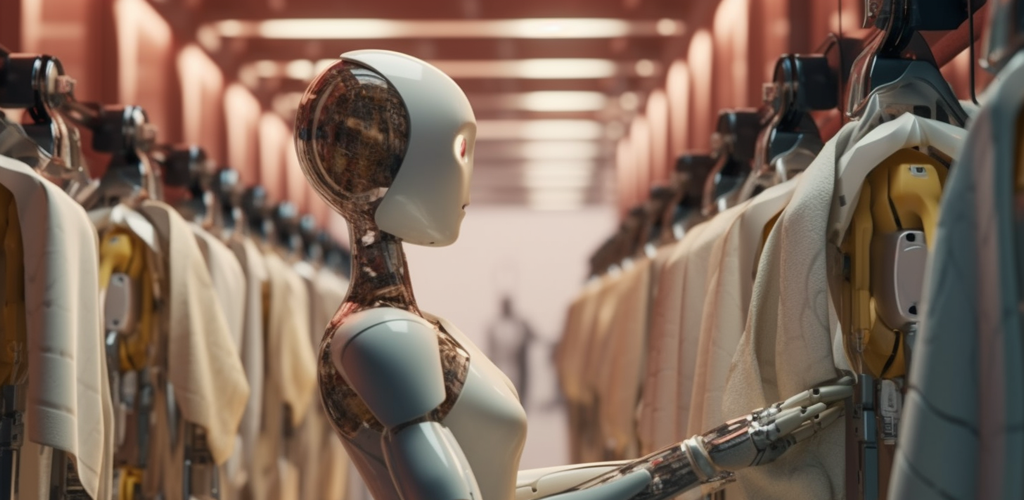How Has AI Revolutionized the Textile Industry?
Artificial Intelligence (AI) has brought unprecedented transformation to numerous sectors, and the textile industry is no exception. With its ability to analyze data and automate processes, Ai tools have proved instrumental in enhancing both the design and manufacturing aspects of textiles. Personalized designs based on customer preferences, optimized patterns, and even the generation of 3D models of garments are all now within reach, thanks to AI.
What Role Does AI Play in Monitoring and Optimizing Production?
AI's involvement doesn't stop at design. It is a significant player in production lines, where it monitors operations and identifies defects. Predicting machine breakdowns and optimizing production schedules are also areas where AI shines. By utilizing AI in these facets, industries see faster production times, fewer errors, and ultimately, lower costs.
How is AI Making Textiles More Sustainable?
Sustainability is a crucial concern in modern industries, and the textile industry is gradually embracing eco-friendly practices with AI's assistance. AI helps identify sustainable materials, thereby reducing the environmental impact of textile production. Moreover, new dyeing processes developed through AI utilize less water and energy, contributing to a greener planet.
What Are Some Innovative Textile Products and Services Enabled by AI?
Innovation driven by AI is leading to an exciting era of new textile products and services. The development of smart textiles, which can sense and adapt to the wearer's environment, is a striking example. Furthermore, virtual showrooms and avatars created by AI allow customers to experience and try on clothes before purchasing, revolutionizing the retail experience.
What Are the Benefits of AI in the Textile Industry?
AI is not only a disruptive technology but also a beneficial one. Here are ten advantages AI offers to the textile industry:
- Enhanced Product Quality: With AI, textile manufacturers can achieve greater precision, leading to superior product quality.
- Improved Efficiency: AI can streamline processes, optimize schedules, and increase production speed.
- Lower Costs: By reducing errors and improving machine longevity, AI contributes to significant cost savings.
- Personalized Designs: AI's data analysis can lead to more personalized and customer-focused designs.
- Innovative Products: The use of AI fosters innovation, enabling the creation of new products like smart textiles.
- Sustainable Practices: AI promotes environmentally friendly practices by optimizing resource usage.
- Virtual Showrooms: AI allows the creation of digital retail experiences, enhancing customer interaction.
- Waste Reduction: By identifying defects early in production, AI helps in minimizing waste.
- Predictive Maintenance: AI's ability to predict machine failure can minimize downtime, ensuring continuous production.
- Market Insights: AI algorithms can analyze consumer behavior and market trends, aiding strategic decision-making.
How is AI Being Utilised in the Textile Industry?
| Company | Use Case | Benefits |
|---|---|---|
| Levi Strauss | Uses AI to design jeans tailored to individual wearers based on data analysis | Enhanced comfort and durability |
| Nike | Employs AI in developing new, improved fabrics | Creation of lighter, stronger, more breathable materials |
| H&M | Utilises AI to reduce waste in textile production | More efficient production, reduced environmental impact |
What Are the Challenges in Implementing AI in the Textile Industry?
Despite numerous benefits, implementing AI in the textile industry comes with its share of challenges. High initial investment costs, technological compatibility issues, lack of skilled workforce and resistance to change among the employees are some of the major hurdles.
What Are the Ethical Implications of Using AI in the Textile Industry?
With the integration of AI comes potential ethical implications. Data privacy and security are significant concerns, as AI often requires access to sensitive information. Furthermore, the automation of processes may lead to job displacement, raising questions about workers' rights and job security.
What Does the Future Hold for AI in the Textile Industry?
Looking ahead, AI's potential to further revolutionize the textile industry is limitless. As AI technology advances, we can anticipate more efficient manufacturing processes, innovative textile products, sustainable practices, and enhanced retail experiences. However, to fully harness the power of AI, industries must overcome the challenges and ethical considerations it presents.
Frequently Asked Questions
How Does AI Improve the Quality of Textiles?
AI enhances textile quality through precise design, early defect identification, and automated processes, resulting in fewer errors and superior products.
In What Ways Does AI Support Sustainability in the Textile Industry?
AI supports sustainability by identifying eco-friendly materials, developing water and energy-efficient dyeing processes, and reducing waste in production.
Can AI Impact the Workforce in the Textile Industry?
AI can automate various processes, potentially leading to job displacement. However, it also opens up opportunities for skilled positions in AI technology.
What are the Challenges in Implementing AI in the Textile Industry?
Challenges include high initial costs, technological compatibility issues, lack of skilled workforce, and resistance to change among employees.
How Can AI Enhance the Retail Experience in the Textile Industry?
AI can create virtual showrooms and avatars, allowing customers to try on clothes virtually, providing an enhanced and personalized retail experience.
In Conclusion
AI's integration into the textile industry is revolutionizing processes from design to manufacturing, ushering in an era of enhanced quality, increased efficiency, and sustainable practices. As this technological advancement continues to unfold, it's crucial to address the challenges and ethical implications it presents, ensuring a future where AI and textiles blend seamlessly and beneficially.

